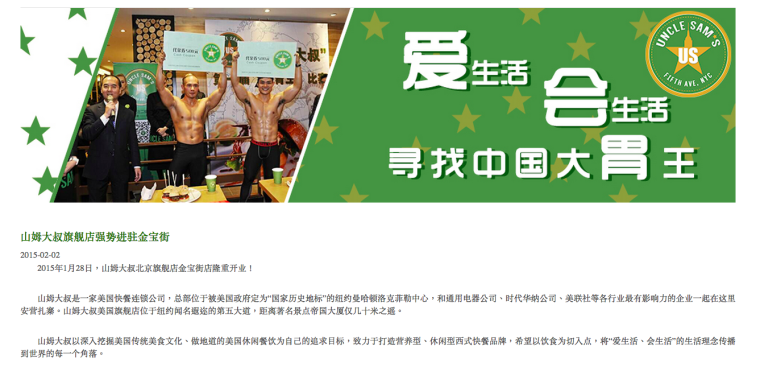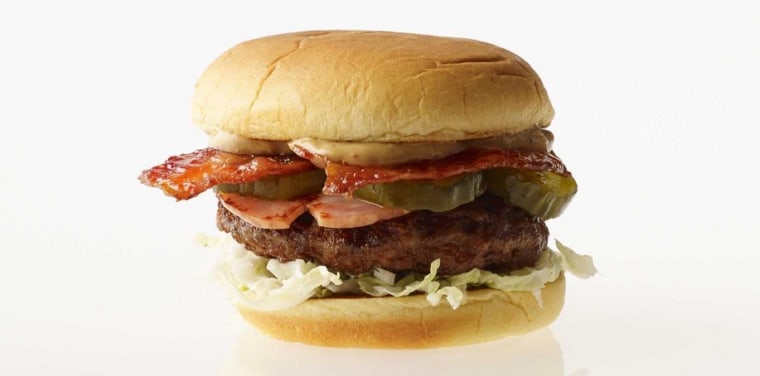Chinese entrepreneur Zhiming Bai had a bold plan - to open an upscale Chinese fast-food joint called Uncle Sam’s Famous American Burgers on Fifth Avenue, in a thicket of well-established American competitors like Shake Shack, McDonalds and Wendy’s. Its selling point? Burgers with an Asian flair that would appeal to Western palates.
But locating Uncle Sam’s New York flagship restaurant in the heart of Manhattan, just a stone’s throw away from the Empire State Building, may also be part of a broader business calculus abroad.
“The tenant felt it was important for their brand to have a presence in the U.S. given the fact that they are creating an Americanized burger chain” in China, Brad Cohen, broker for the landlord, Elijah Equities, told NBC News.
Uncle Sam’s first made headlines last summer with news that the nascent chain would rent out space at 307 Fifth Avenue for its first restaurant in America. Media reports at the time said its New York restaurant was originally scheduled to open by the end of last year. But Uncle Sam’s New York location was still under construction as of late March - even as its Chinese-language website described its American flagship restaurant as “being situated” on Fifth Avenue.

“Our understanding was that this was to be their flagship store before opening a franchise in China,” Cohen said. Uncle Sam’s website reported that its flagship store in Beijing had already opened on January 28.
Stephanie Fray of Conundrum, the media relations firm representing Uncle Sam’s, said in an email that the chain plans to open its New York store sometime in the Spring and that, contrary to media reports, the New York restaurant was “never scheduled” to open at the end of 2014. The firm recently put a press release announcing a May 18th opening.
On its Chinese-language website, Uncle Sam’s describes itself as an “American fast-food chain,” noting that its headquarters is located in a “national historic landmark” - Rockefeller Center. It also says the Uncle Sam brand name originates from a man named “Sam Berg,” who established it in Colorado in 1933. Then in 2014, the website says, Uncle Sam’s “officially entered China.”
The chain’s business model is ambitious. Uncle Sam’s wrote in an email that it “has expansion plans in both China and the U.S,” but added that “nothing is definitive at this time.” On February 2, one Chinese news website quoted the “person in charge” of Uncle Sam’s as saying it plans to open up two new restaurants every month in 2015. Within six years, Uncle Sam’s expects to have 100 restaurants in Beijing and 1,000 throughout China, the article said.
“Reception in China for the concept has been far greater than they expected,” Cohen, the landlord’s broker, said.
Cohen said typical asking rent for ground-floor property where Uncle Sam’s is expected to open in New York is between $150 and $200 per square foot. Excluding the 2,000 square feet that Uncle Sam’s is also renting in the basement and on the mezzanine, that puts the chain’s annual rent for 3,600 square feet somewhere between $540,000 and $720,000.
It remains to be seen whether a Chinese fast-food chain will catch on with New Yorkers. Uncle Sam’s said its menus in China and New York differ slightly, with the Chinese menu tending to “skew more American" and the American one focusing “on more Asian flavors.” Uncle Sam's American research and development team in the U.S., its website said, is led by Bradford Thompson, who won the Food and Wine Best New Chef award in 2004 and is founder and CEO of Bellyfull Consulting, a culinary consulting firm in New York.
“In China, Uncle Sam denotes a familiar, trustworthy American brand with mass appeal"
Uncle Sam's said some of the chain's menu items include a K-Town Burger, made with Galbi beef, kimchi and fermented black bean; the Top Dog, with Sichuan chili, Char-Siu bacon and Pepper Jack cheese; and the Spicy Avocado Burger, topped with marinated Napa cabbage and sliced avocado.
Despite potential competition from chains near Fifth Avenue, Uncle Sam’s may have little trouble attracting inquisitive customers - that is, if reaction from the lunch-hour crowd in Murray Hill in late March serves as an accurate barometer of interest.
“I’m willing to try it,” said Justin Hablitz, a 23-year-old in the United States Army who was leaning against a wall with his skateboard a few doors down from 307 Fifth Avenue. “It’s something different.”
Sebastien Diss, a tourist in from France who was visiting New York, agreed. "Why not?" he replied, adding that while he doesn’t eat burgers often, he would visit Uncle Sam’s should he return to Manhattan.
“Different” was one adjective used to describe Uncle Sam’s. “Interesting” was another. That was also Bailey Miller’s word of choice.
“I’d be a little curious, more so about what the name is supposed to invoke in an American audience,” said Miller, 20, a student at Vassar College.

For most Americans, the name “Uncle Sam” conjures up the famous image of the white-bearded, top-hat-wearing man from the “I Want You For U.S. Army” poster, created by James Montgomery Flagg in 1917. For Chinese, the moniker “Uncle McDonald” refers to a different iconic figure - Ronald McDonald, the mascot of the American burger chain McDonald’s, which is popular in China.
What, then, might the name Uncle Sam mean to a Chinese audience?
“In China, Uncle Sam denotes a familiar, trustworthy American brand with mass appeal,” the chain wrote. “Similarly, in sharing the same initials as the United States, it is easy for the Chinese to recall the brand name."
Asked what separates itself from other chains like Shake Shack, McDonald's and Wendy's, Uncle Sam's wrote, "Our intent is not to compete with this market segment, but rather to create a one-of-a-kind experience to complement the burger landscape."
Like NBC Asian America on Facebook and follow us on Twitter.